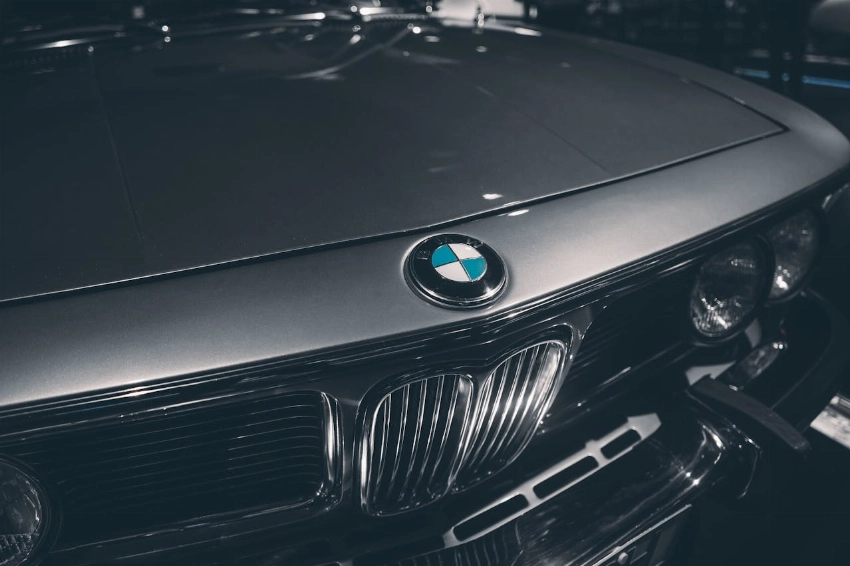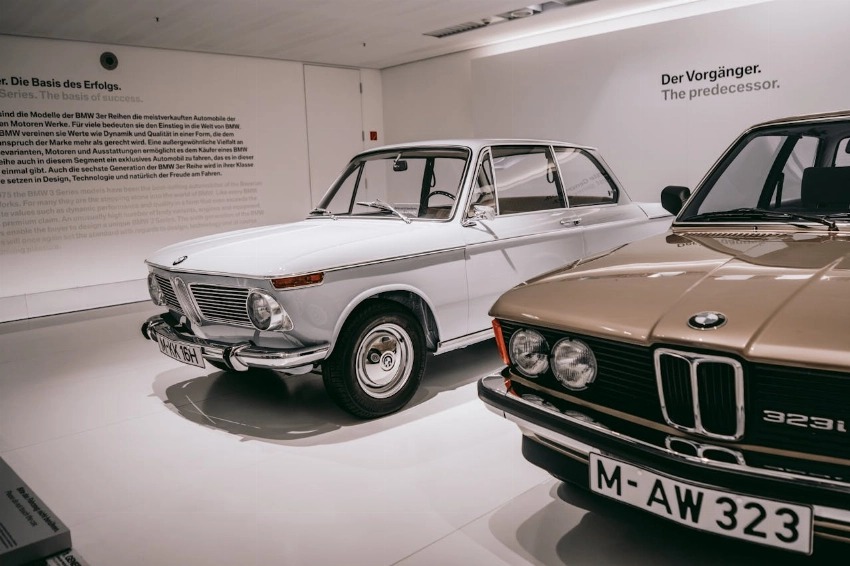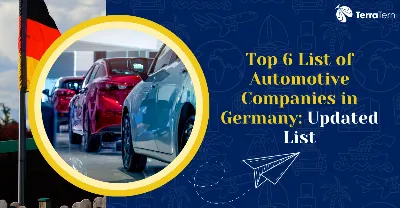Key Highlights
- Latest List of Automotive Companies in Germany in 2025
- What Are the Major Automotive Companies in Germany in 2025?
- Which Are the Leading Automotive Suppliers in Germany in 2025?
- What Automotive Software Companies Operate in Germany?
- How Many Automotive Startups Are There in Germany in 2025?
- Where Are Germany's Automotive Companies Located?
- Why Is Germany's Automotive Industry Important Globally? Experts Insights 2025
- What Types of Vehicles Do German Automotive Companies Produce?
- How Is Germany's Automotive Industry Changing in 2025?
- What Career Opportunities Exist in Germany's Automotive Industry?
- What Are Germany's Automotive Industry Associations and Resources? Experts Insights 2025
- Germany's Automotive Industry: 2025 Key Statistics
- Conclusion
Germany is a motor powerhouse of some of the most luxurious car makers in the world. The Germany Auto companies are made up of iconic brands that have been known to engineer excellence, innovation and performance. Displays several premium cars and commercial trucks. German automotive manufacturers employ more than 800,000 people and make over 400 billion Euros annually. This is a list of the luxury and automotive manufacturers that will play an active role in Germany in the year 2025. Motor Vehicle Manufacturers in Germany - The List Includes industry-leading brands based on engineering, innovation and performance.
Latest List of Automotive Companies in Germany in 2025

The list of automotive companies in germany is as follows:
|
Company Name |
Location |
Category |
Employees |
Specialization |
|
Volkswagen AG |
Wolfsburg |
OEM |
663,000 |
multi-brand group for passenger cars (Audi, Porsche, Seat, Skoda), (See Article 49(1) for more details) Mercedes-Benz Group AG |
|
Mercedes-Benz Group AG |
Stuttgart |
OEM |
290,000 |
Luxury cars, luxury brands (Mini, BMW, Rolls-Royce) |
|
BMW AG |
Munich |
OEM |
120,000 |
High-priced car models, luxury brands (BMW, Mini, Rolls-Royce) |
|
Audi AG |
Ingolstadt |
OEM |
90,000 |
High-end vehicles, racing cars (Lamborghini, Ducati) |
|
TRATON SE |
Munich |
Commercial OEM |
83,000 |
MAN- Scania, Navistar, RIO Commercially Available |
|
Porsche AG |
Stuttgart |
OEM |
Part of VW Group |
Motor vehicles - High-performance sports cars and SUVs |
Also Read: Top Automotive Jobs in Germany: Companies, Salary & More
What Are the Major Automotive Companies in Germany in 2025?
The list of automotive companies in Germany features five dominant OEMs—Volkswagen AG, Mercedes-Benz Group AG, BMW AG, Audi AG, and TRATON SE. Beyond traditional manufacturers, the list of automotive software companies in Germany includes 100+ technology firms developing autonomous driving, connected vehicle solutions, and AI-powered mobility platforms. The list of startups in Germany for automotive companies encompasses innovative ventures focused on electric mobility, battery analytics, and next-generation vehicle technologies, revolutionising the industry.
Volkswagen AG – Germany's Largest Automaker (List of Automotive Companies in Germany)
-
The list of automotive companies in Germany is led by Volkswagen AG (Wolfsburg), which employs 663,000 people worldwide and operates as one of the world's largest automotive groups, with brands including VW, Audi, Porsche, Seat, and Skoda.
-
Volkswagen captured 20.4% market share in Germany during H1 2025 with 285,998 vehicle registrations, maintaining its dominant position despite a slight 1.1% decline while generating €324.656 billion in 2024 revenue.
-
The VW Group operates 114 production plants across 27 countries on four continents and delivered 6.6 million vehicles globally through September 2025.
-
Volkswagen leads Germany's electric vehicle market as the best-selling BEV brand throughout 2025, with the VW ID.7 ranking as the top-selling electric car model.
-
The list of automotive software companies in Germany includes VW's digital initiatives, as the automaker joined 11 German companies in 2025 to develop an open-source vehicle software ecosystem competing with Chinese EV manufacturers.
Mercedes-Benz Group AG – Premium Vehicle Leader (List of Automotive Companies in Germany)
-
The list of automotive companies in Germany includes Mercedes-Benz Group AG (Stuttgart) as the leading premium manufacturer, with approximately 290,000 employees globally and over a century of automotive innovation.
-
Mercedes-Benz secured a 9.1% market share in the German market in H1 2025, with 126,964 vehicle registrations, posting a marginal 0.1% growth and maintaining its position as Germany's second-largest automotive brand.
-
The company underwent a significant structural transformation, separating its commercial vehicle division into independent Daimler Truck AG while rebranding the passenger car division as Mercedes-Benz Group.
-
Mercedes-Benz maintains its premium positioning with flagship models like the S-Class, E-Class, and EQS electric luxury sedan, directly competing with BMW and Audi in the luxury segment.
BMW AG – Munich's Automotive Powerhouse (List of Automotive Companies in Germany)
-
The list of automotive companies in Germany features BMW AG (Munich), which has 120,000 global employees and ranks among the world's 15 most prominent automobile manufacturers. It operates premium brands BMW, Mini, and Rolls-Royce.
-
BMW achieved 8.5% German market share in H1 2025 with 119,084 vehicle registrations, posting strong 3.8% growth and solidifying its position as Germany's third-largest automotive brand.
-
Founded in 1916 as an aircraft engine manufacturer, BMW evolved into a car and motorcycle manufacturer, with both product lines remaining core business pillars representing the brand's engineering prowess.
-
The BMW Group portfolio spans from affordable Mini compact cars through premium BMW sedans and SUVs to ultra-luxury Rolls-Royce vehicles, covering multiple market segments.
-
The list of automotive software companies in Germany includes BMW Digital Solutions, as the automaker partners with Vector Informatik, ETAS, and other technology firms to develop autonomous driving and connected mobility solutions.
Audi AG – Volkswagen's Premium Division (List of Automotive Companies in Germany)
-
The list of automotive companies in Germany includes Audi AG (Ingolstadt), which has operated as an independent premium brand within the Volkswagen Group since the 1960s and employs approximately 90,000 people worldwide.
-
Audi captured 7.0% German market share in H1 2025 with 97,731 vehicle registrations, experiencing a 6.2% decline amid challenging premium segment conditions.
-
The Audi subgroup extends beyond passenger cars to include high-performance sports car manufacturer Lamborghini and premium motorcycle brand Ducati, creating a diversified luxury mobility portfolio.
-
Audi maintains its reputation for technological innovation, quattro all-wheel-drive systems, progressive design language, and pioneering LED/laser lighting technologies that set industry standards.
-
The list of startups in Germany for automotive companies includes Audi's venture investments in electric mobility, autonomous driving, and digital services as the brand accelerates electrification strategies.
TRATON SE – Commercial Vehicle Specialist (List of Automotive Companies in Germany)
-
The list of automotive companies in Germany includes TRATON SE (Munich), which serves as Volkswagen Group's commercial vehicle specialist. It has approximately 105,000 employees worldwide and operates major brands such as MAN, Scania, International (Navistar), VW Truck & Bus, IC Bus, and Neoplan.
-
Previously known as Volkswagen Truck & Bus until the 2018 rebranding, TRATON operates as a semi-independent commercial vehicle powerhouse with Volkswagen maintaining an 87.5% ownership stake.
-
TRATON sold 334,215 commercial vehicles globally in 2024, but in Q3 2025, sales declined to 71,400 vehicles amid challenging market conditions affecting the truck and bus segments.
-
The company specialises exclusively in trucks, buses, and utility vehicles serving global logistics, transportation, and public transit markets across Europe, the Americas, and emerging economies.
Porsche – High-Performance Sports Car Manufacturer (List of Automotive Companies in Germany)
-
The list of automotive companies in Germany includes Porsche, the renowned high-performance sports car specialist within Volkswagen Group's premium brand portfolio, recognised globally for its engineering excellence.
-
Porsche registered 16,513 vehicles in Germany during H1 2025, achieving a 1.2% market share. This represents a significant 24.5% decline amid challenging luxury market conditions and economic headwinds.
-
The brand maintains legendary status through iconic models, including the 911 sports car, Cayenne SUV, Macan compact SUV, Panamera sedan, and all-electric Taycan performance vehicle.
-
Porsche SE functions as a holding company with significant ownership stakes in both Porsche AG and Volkswagen AG, creating unique cross-ownership dynamics within the broader VW Group structure.
-
The list of automotive software companies in Germany increasingly includes Porsche's digital initiatives as the brand invests heavily in electric powertrains, connected car technologies, and software-defined vehicle architectures for future models.
Which Are the Leading Automotive Suppliers in Germany in 2025?

The list of automotive companies in Germany extends far beyond OEMs to include 350+ major automotive suppliers forming the backbone of the nation's manufacturing ecosystem, with top-tier suppliers like Robert Bosch, Continental AG, ZF Friedrichshafen, Schaeffler AG, and HELLA employing over 950,000 people globally.
The list of automotive software companies in Germany increasingly includes traditional suppliers like Bosch and Continental, who are transforming into technology providers developing autonomous driving sensors, connected vehicle systems, and software-defined vehicle architectures.
The list of startups in Germany for automotive companies complements established suppliers by innovating in electric mobility, battery management, and next-generation automotive technologies.
Robert Bosch GmbH – World's Largest Automotive Supplier
-
The list of automotive companies in Germany is topped by Robert Bosch GmbH (Stuttgart/Gerlingen) with €91.6 billion revenue in FY 2023 and 429,416 employees globally (nearly 140,000 at 85 German locations), ranking as the world's largest automotive supplier.
-
Founded in 1886 as a backyard workshop for precision mechanics and electrical engineering, Bosch evolved into a global conglomerate supplying automotive electronics, powertrain systems, safety technologies, including ABS and ESC, plus industrial technology, household appliances, and power tools.
-
Bosch's automotive portfolio encompasses electric drive components, fuel injection systems, control technology, exhaust systems, braking systems, driver assistance systems, and connected mobility solutions, demonstrating comprehensive system competence in hardware and software.
-
The list of automotive software companies in Germany prominently features Bosch as a key player in developing semiconductors, power electronics (SiC), ADAS technologies, and software-defined vehicle platforms to address electrification and automation trends.
Continental AG – Tire and Automotive Technology Giant
-
The list of automotive companies in Germany includes Continental AG (Hanover) as the second-largest German supplier and third-largest globally. The company employs 241,000 people across 540 locations in 60 countries, demonstrating a massive international presence.
-
Founded in 1871, Continental began with rubber and tyre manufacturing for passenger cars, commercial vehicles, and motorcycles. It later significantly expanded into automotive technologies, including autonomous driving systems, vehicle safety, and connected mobility platforms.
-
Continental AG ranks #3 globally among automotive suppliers with €38.198 billion automotive revenue in 2021, trailing only Bosch and Japanese supplier Denso in the worldwide supplier hierarchy.
-
The list of automotive software companies in Germany includes Continental's technology division as a consortium member. It is developing open-source vehicle software ecosystems alongside BMW, Mercedes-Benz, VW, and Bosch for autonomous and connected vehicle solutions.
ZF Friedrichshafen AG – Driveline and Chassis Technology Leader
-
The list of automotive companies in Germany includes ZF Friedrichshafen AG, founded in 1915 with connections to gear factories, and Zeppelin GmbH, which employs nearly 150,000 people across 230 locations in 40 countries.
-
ZF ranks #4 globally among automotive suppliers with €34.865 billionin revenue in 2021, specialising in vehicle transmissions, chassis modules, axle drives, driveline components, and advanced damping technology for passenger and commercial vehicles.
-
ZF's product portfolio encompasses automatic transmissions, manual gearboxes, axle systems, steering systems, chassis components, and active/passive safety technologies serving both passenger car and commercial vehicle segments.
-
The list of automotive software companies in Germany increasingly includes ZF as the supplier invests in electric drive systems, autonomous driving technologies, and integrated mobility solutions for software-defined vehicles.
Schaeffler AG – Bearing and Clutch Manufacturing Specialist
-
The list of automotive companies in Germany features Schaeffler AG (Herzogenaurach) as the core company of the family-owned Schaeffler Group with approximately 92,000 employees across 170+ locations in over 50 countries.
-
Schaeffler manufactures precision components for automotive, mechanical engineering, and aerospace industries under three prominent brands: FAG (ball bearings from former FAG Kugelfischer), LuK (disc and clutch systems), and INA (rolling bearings).
-
The company ranks #28 globally among automotive suppliers with €10.284 billion in revenue in 2021, specialising in bearing technology and clutch manufacturing systems for conventional and electric powertrains.
-
The list of startups in Germany for automotive companies includes Schaeffler's strategic investments in electric mobility components, hybrid systems, and digital services as the company transitions from traditional bearings toward e-mobility solutions.
HELLA GmbH & Co. KGaA – Lighting and Electronics Expert
-
The list of automotive companies in Germany includes HELLA GmbH & Co. KGaA (Lippstadt), which specialises entirely in vehicle lighting and illumination systems and has nearly 39,000 employees across 125+ locations in more than 35 countries.
-
HELLA ranks #44 globally among automotive suppliers with €5.904 billion in revenue in 2021, producing headlamps, exterior lights, interior lighting for all vehicle types, as well as camera-based driver assistance systems and electronic solutions.
-
The company's product portfolio emphasises lighting technology heritage while expanding into electronics. It enhances vehicle efficiency, safety, and comfort through sensors, actuators, and control units for modern automobiles.
-
The list of automotive software companies in Germany includes HELLA, as the company develops camera-based ADAS systems, lighting control software, and electronic modules integrating hardware with digital solutions for connected vehicles.
|
Supplier Name |
Headquarters |
Employees |
Core Products/Expertise |
Global Rank |
Revenue (EUR) |
|
Robert Bosch GmbH |
Stuttgart/Gerlingen |
429,416 |
Electronics, powertrains, ADAS |
#1 |
91.6 billion (2023) |
|
Continental AG |
Hanover |
241,000 |
Tires, tech, connected cars, safety |
#3 |
38.2 billion (2021) |
|
ZF Friedrichshafen |
Friedrichshafen |
150,000 |
Chassis, driveline, transmissions |
#4 |
34.9 billion (2021) |
|
Schaeffler AG |
Herzogenaurach |
92,000 |
Bearings, hybrid, e-mobility |
#28 |
10.3 billion (2021) |
|
HELLA GmbH & Co. KGaA |
Lippstadt |
39,000 |
Lighting, electronics, ADAS |
#44 |
5.9 billion (2021) |
Also Read: Top Manufacturing Companies in Germany: Expert List
What Automotive Software Companies Operate in Germany?
The list of automotive software companies in Germany includes over 100 specialised technology firms. These firms are developing autonomous driving systems, connected vehicle platforms, software-defined vehicle architectures, AI/ML applications, and mobility solutions that are transforming the automotive industry.
These companies range from established tier-1 supplier software divisions like Elektrobit and ETAS to innovative startups in Germany for automotive companies, such as TWAICE, COMPREDICT, and High Mobility, that focus on battery analytics, predictive maintenance, and connected car APIs.
The list of automotive companies in Germany increasingly includes software-first businesses. The industry is undergoing a fundamental transformation toward software-defined vehicles (SDVs), with traditional hardware suppliers investing billions in digital capabilities.
Elektrobit – Automotive Software and Embedded Systems
-
Specialises in embedded systems, connected car platforms, and automotive operating system development for modern vehicles
-
Provides software solutions for advanced driver assistance systems (ADAS), in-vehicle infotainment, and electronic control units (ECUs)
-
Expertise spans software architecture, functional safety development, and over-the-air (OTA) update capabilities.
-
Headquartered in Erlangen with strong partnerships serving major global automotive manufacturers
-
Maintains Continental ownership connection while advancing software-defined vehicle transformation initiatives
ETAS – Bosch's Automotive Software Division
-
Robert Bosch GmbH is a subsidiary leading Germany's automotive software sector with specialised ECU development solutions.
-
Provides integrated toolchains supporting the complete development lifecycle from requirements engineering to production validation
-
Software platforms enable OEMs and suppliers to develop, test, and calibrate embedded automotive systems efficiently.
-
Specialises in automotive testing tools, embedded systems expertise, and development environment solutions
-
Serves global manufacturers across passenger cars, commercial vehicles, and off-highway applications with deep Bosch integration
Continental Software Division – Connected Mobility Solutions
-
Develops powertrain control, chassis systems, and connected vehicle platforms from Continental AG headquarters in Germany
-
Specialises in software-defined vehicle (SDV) architectures enabling advanced over-the-air updates and centralised computing
-
Software capabilities encompass artificial intelligence applications for autonomous driving and predictive maintenance algorithms
-
Provides cloud-connected mobility services, distinguishing the software division from tyre and hardware business operations
-
Collaborates with major OEMs implementing next-generation vehicle software architectures supporting electrification and automation
COMPREDICT GmbH – AI-Based Virtual Sensors
-
Founded in 2016, providing AI-based software algorithms exploiting in-vehicle data using machine learning and artificial intelligence
-
Develops virtual sensors determining realistic component loads, predicting lifetime, and optimising lightweight vehicle components
-
Methodologies generate deep insights into real vehicle usage across braking, powertrain, chassis, suspension, batteries, and motors.
-
Serves automotive manufacturers seeking to reduce energy consumption through intelligent data-driven component design
-
German startup positioning with a focus on large-scale data analytics and predictive maintenance solutions
TWAICE – Predictive Battery Analytics Software
-
Technical University Munich spin-off founded in 2018, headquartered in Munich, specialising in battery technology.
-
Provides predictive battery analytics software based on digital twin technology for efficient battery system development
-
Precise battery condition and ageing predictions optimise battery development, usage patterns, and second-life applications.
-
Enables certification of batteries for reuse, serving electric vehicle manufacturers and energy storage operators
-
Software empowers customers to improve battery reliability, durability, and sustainability across global industries.
High Mobility GmbH – Connected Car API Platform
-
Founded in 2013 with offices in Berlin and Tallinn, operating an award-winning developer platform for connected cars
-
Provides developers with standardised car APIs for building, testing, and publishing automotive applications efficiently
-
Platform utilised by market leaders Porsche, Volkswagen, and Mercedes-Benz for advancing connected car initiatives
-
Connects apps with connected cars through a unique carmaker-endorsed platform, simplifying vehicle data access
-
Supports developers and carmakers in digitally transforming the automotive industry through API standardisation
|
Company |
Focus Area(s) |
Notable Clients/Partners |
|
Elektrobit |
Embedded systems, ADAS, OTA, car OS |
Major OEMs, Continental |
|
ETAS |
ECUs, embedded tools, testing |
Bosch, multi-OEM |
|
Continental (Software) |
AI, connected mobility, vehicle OS |
OEMs, tech partnerships |
|
COMPREDICT |
AI-based virtual sensors, data analytics |
OEMs, startups |
|
TWAICE |
Battery analytics, digital twins |
EV manufacturers |
|
High Mobility |
Connected car APIs, developer platform |
Porsche, VW, Mercedes-Benz |
How Many Automotive Startups Are There in Germany in 2025?

Germany's automotive startup ecosystem comprises over 100 startups in Germany for automotive companies tracked across innovation databases, representing Europe's most dynamic vehicle technology innovation hub. These startups span diverse focus areas, including electric vehicle infrastructure, autonomous driving solutions, fleet management platforms, mobility-as-a-service offerings, battery technology innovation, and automotive software development.
Fernride – Logistics Automation Startup
-
Founded in 2019, leading Germany's automotive startup scene with autonomous logistics solutions for freight and warehouses
-
Develops remote-controlled and autonomous vehicle technology designed explicitly for logistics environments and operations
-
The platform enables efficient freight movement through yards, warehouses, and distribution centres using advanced autonomy software.
-
Berlin-based company driving automation across the logistics industry through innovative autonomous driving applications.
-
Represents Germany's innovation in applying autonomous vehicle technology to industrial and commercial logistics use cases
Vimcar – Fleet Management Software Platform
-
Established in 2014, providing fleet management software enabling businesses to track, manage, and optimise vehicles efficiently
-
The platform offers GPS tracking, driver behaviour analysis, maintenance scheduling, and digital logbook solutions.
-
Telematics solutions help fleet managers reduce costs, improve driver safety, and ensure regulatory compliance.
-
Serves small to medium-sized businesses across Germany seeking affordable, easy-to-implement fleet management technology
-
German startup specialising in commercial vehicle operators and fleet optimisation through connected vehicle data
AUTO1 Group – Digital Automotive Trading Platform
-
Founded in 2012, operating as Europe's leading digital automotive platform connecting vehicle buyers and sellers
-
Revolutionises automotive wholesale through innovative marketplace technology, enabling frictionless B2B vehicle transactions
-
The platform facilitates used car remarketing, providing dealers with efficient purchasing channels and transparent pricing mechanisms
-
German unicorn startup representing the successful digitalisation of traditional automotive wholesale markets across Europe
-
Scale and market coverage position AUTO1 as a dominant player in European automotive remarketing technology
holoride GmbH – In-Car XR Entertainment
-
Founded in 2019, pioneering in-car entertainment, transforming vehicles into moving theme parks through extended reality technology
-
Leverages real-time motion and location data from moving vehicles to create immersive, synchronised experiences
-
Retrofit solution, as a smart speaker-sized device, brings content platforms to any vehicle, regardless of model or year.
-
Technology reduces motion sickness symptoms through synchronised XR experiences aligned with vehicle movement.s
-
Available across Audi series vehicles with the Audi partnership and expanding to additional automotive brands globally
CarOnSale – B2B Online Auction Platform
-
Founded in 2019, developing an innovative B2B marketplace making automotive wholesale frictionless across European markets
-
The platform connects professional buyers and sellers through digital auction technology, replacing traditional physical remarketing.
-
Vision focuses on providing customers with the easiest, most profitable, and personal solution for used vehicle trading.
-
German startup sets new standards in automotive wholesale digitisation with ambitious European expansion plans.
-
Specialises in remarketing and the wholesale auction model, serving professional automotive traders and dealers
German Autolabs – Digital Assistant for Drivers
-
Founded in 2016, developing AI-powered digital assistant technology for drivers using voice and gesture control systems
-
Provides hands-free driver assistance enabling safer vehicle operation through natural voice commands and intuitive gesture recognition
-
AI integration offers intelligent driver support features, reducing distraction while maintaining connectivity and vehicle control.
-
Founded by industry veterans with backgrounds from the Aupeo music streaming service and HERE navigation technology platforms
-
Berlin-based startup focusing on aftermarket digital assistant solutions compatible across vehicle models and manufacturers.
Also Read: Top 10 Construction Companies in Germany: Latest List
|
Startup |
Founding Year |
HQ/Location |
Focus Area(s) |
Flagship Product/Service |
|
Fernride |
2019 |
Berlin |
Autonomous logistics, automation |
Autonomous yard trucks |
|
Vimcar |
2014 |
Berlin |
Fleet management software |
Fleet tracking/logbook |
|
AUTO1 Group |
2012 |
Berlin |
Auto trading (B2B, digital) |
AUTO1.com, wirkaufendeinauto.de |
|
holoride GmbH |
2019 |
Berlin |
In-car XR/entertainment |
XR headset & content |
|
CarOnSale |
2019 |
Berlin |
B2B auction platform |
Used car online auctions |
|
German Autolabs |
2016 |
Berlin |
AI assistants, voice/gesture |
Chris's digital assistant |
Where Are Germany's Automotive Companies Located?
Germany's automotive industry is concentrated in distinct regional clusters across Baden-Württemberg, Bavaria, Lower Saxony, and North Rhine-Westphalia, creating specialised manufacturing and supplier ecosystems. Over 75% of Germany's 100 largest automotive suppliers maintain headquarters in these three southern and western states, reflecting historical industry development and proximity to major OEM facilities. The geographic distribution creates specialised automotive regions with complementary capabilities spanning vehicle manufacturing, component supply, and technology development, supporting Germany's position as Europe's automotive manufacturing leader.
Baden-Württemberg – Stuttgart Automotive Hub
-
The Stuttgart region represents Germany's most concentrated automotive hub, hosting Mercedes-Benz Group AG and Porsche AG headquarters.
-
Extensive supplier networks, including Robert Bosch GmbH, support major OEMs with engineering talent and manufacturing capabilities.
-
Porsche's production centre in Zuffenhausen (northern Stuttgart) manufactures 911 sports cars and all-electric Taycan models.
-
Stuttgart's automotive ecosystem includes research institutions, engineering firms, and technology companies, creating comprehensive industry clusters.
-
The region's automotive heritage spans over a century, establishing Stuttgart as synonymous with German automotive excellence.
Bavaria – Munich and Ingolstadt Manufacturing Centres
-
Bavaria hosts Germany's second-largest automotive concentration, with BMW AG headquartered in Munich and Audi AG based in Ingolstadt.
-
BMW Group Plant Munich employs approximately 6,500 employees from over 60 nations, producing cars and motorcycles since 1922.
-
Munich additionally houses TRATON SE (Volkswagen commercial vehicle division) and numerous automotive technology startups.
-
Region's automotive ecosystem benefits from the Technical University of Munich and a strong engineering education infrastructure supporting innovation.
-
Bavaria's automotive industry employs tens of thousands across manufacturing, research and development, and supplier operations.
Lower Saxony – Volkswagen's Wolfsburg Home
-
Wolfsburg serves as Volkswagen AG's global headquarters, housing the world's largest single-site vehicle manufacturing complex covering 6.5 million square meters.
-
Volkswagen's Wolfsburg plant employs approximately 70,000 workers, producing 490,000 vehicles annually across multiple model lines.
-
The Lower Saxony state government maintains stakeholder interests in Volkswagen, creating unique public-private automotive partnerships.
-
Regional supplier companies and research facilities, including Open Hybrid LabFactory and Automotive Research Centre Niedersachsen, support extensive production.
-
Continental AG's new corporate headquarters in Hanover houses around 2,400 employees in group functions, Tires, and ContiTech divisions.
North Rhine-Westphalia – Supplier Concentration
-
North Rhine-Westphalia hosts approximately 800 automotive companies employing around 200,000 workers in the automotive sector.
-
Almost every third German automotive supplier maintains headquarters in NRW, creating Europe's densest supplier ecosystem.
-
Primary operations include Ford manufacturing in Cologne, Daimler facilities in Düsseldorf, and the thyssenkrupp automotive technology division.
-
ThyssenKrupp Automotive Technology generates approximately 5.4 billion euros in sales with 26,000 employees at over 60 global locations.
-
Region's supplier specialisation encompasses camshafts, steering systems, dampers, springs, stabilisers, and complete axle module assembly.
Why Is Germany's Automotive Industry Important Globally? Experts Insights 2025

Germany's automotive industry stands as one of the world's most influential manufacturing sectors, generating EUR 536.1 billion in annual revenue and commanding Europe's most significant production and sales market.
-
Manufacturing Leadership: Germany produced 4.1 million passenger cars and 351,000 commercial vehicles in 2024, operating 51 automobile assembly and production sites, making it Europe's undisputed car production leader.
-
Export Dominance: German automotive exports generated EUR 372.2 billion in foreign market revenue (2024), representing 23.8% of all German exports and making vehicles the product group with Germany's most significant export share.
-
Innovation Investment: German OEMs account for one-third of global automotive research and development spending, driving innovation in alternative drive technologies, software-defined vehicles, and advanced driver assistance systems.
-
Global Supplier Network: Eighteen of the world's 100 top automotive suppliers are German companies, establishing comprehensive value chain integration from components to complete vehicle manufacturing.
-
Engineering Reputation: German automotive brands—Mercedes-Benz, BMW, Volkswagen, Audi, Porsche—embody globally cherished values of innovation, reliability, safety, and design, commanding premium market positioning across continents.
Also Read: Automotive Companies in Australia: Evolution and Future Trends
What Types of Vehicles Do German Automotive Companies Produce?
German automotive companies manufacture a comprehensive range of vehicles, including passenger cars, electric vehicles, commercial trucks and buses, luxury sedans, high-performance sports cars, and motorcycles, across diverse market segments.
Passenger Cars – Germany's Core Production
-
Passenger car production reached 3.139 million units from January to September 2025, with a 2% year-over-year growth, representing Germany's primary automotive output.
-
Volkswagen Golf maintained its position as Germany's top-selling car model, with production spanning compact, mid-size, and luxury segments.
-
German manufacturers produce diverse passenger car types, including hatchbacks, sedans, wagons, and SUVs, across multiple price points.
-
Mercedes-Benz, BMW, and Audi specialise in premium passenger vehicles, while Volkswagen, Opel, and Ford serve the mass-market segments.
-
In May 2025, passenger car production reached 363,600 units, marking a 19% year-over-year growth despite remaining 15% below pre-crisis 2019 levels.
Electric Vehicles – Growing Segment
-
Battery-electric vehicle sales forecast to surge 75% in 2025 to 666,000 units, capturing increased market share driven by EU emissions regulations.
-
Electric vehicle production expected to reach 1.7 million units in 202,5, consolidating Germany's position as the world's second-largest EV production location after China.
-
Volkswagen leads German EV sales with ID series models, while BMW, Mercedes-Benz EQ series, and Audi e-tron lineup expand premium electric offerings.
-
Electric car production growth projected at 30% with BEV production increasing to 1.39 million units and PHEV reaching 330,000 units.
-
August 2025 electric registrations surged 56% year-over-year, with BEVs up 46% and PHEVs increasing 77% demonstrating accelerating electrification.
Commercial Vehicles – Trucks, Buses, and Vans
-
German commercial vehicle production centres on TRATON SE, which operates the MAN, Scania, and Navistar brands, serving global markets with 83,000 employees.
-
Mercedes-Benz operates a separate commercial vehicle division producing trucks, buses, and vans for the logistics and transportation sectors.
-
Global van production grew 1% the first half of 2025, with European manufacturers, including German companies, contributing significantly to output.
-
Commercial vehicles serve the logistics, public transportation, and utility sectors, which are critical to economic infrastructure across Germany and export markets.
-
German manufacturers maintain strong positions in heavy-duty trucks and premium commercial vehicle segments with extensive international operations.
Luxury and Sports Cars – Premium Segment Leaders
-
Germany dominates global luxury automotive production through Mercedes-Benz, BMW, and Audi, collectively controlling significant premium market share worldwide.
-
Porsche specialises in high-performance sports cars, manufacturing 911 models and all-electric Taycan vehicles at the Zuffenhausen facility.
-
Audi's ownership of Lamborghini extends German premium capabilities into ultra-high-performance sports car manufacturing and exotic vehicle segments.
-
Mercedes-Benz maintains a reputation for comfort-oriented luxury vehicles, while BMW emphasises driving dynamics in premium segments with distinct brand positioning.
-
German luxury brands embody globally recognised values of innovation, reliability, safety, and design, commanding premium pricing across continents.
|
Type of Vehicle |
Description/Examples |
Companies |
|
Passenger Cars |
Hatchbacks, sedans, SUVs |
VW, Mercedes-Benz, BMW, Audi, Opel |
|
Electric Vehicles (EV) |
BEVs, PHEVs, hybrids |
Volkswagen (ID. series), BMW, Mercedes-Benz EQ |
|
Commercial Vehicles |
Trucks, buses, vans |
TRATON SE, Mercedes-Benz CV, MAN, Scania |
|
Luxury/Sports Cars |
High performance, premium |
Porsche, Audi (Lamborghini), Mercedes-Benz S |
|
Motorcycles |
Premium sport/road bikes |
BMW, Ducati (Audi), others |
How Is Germany's Automotive Industry Changing in 2025?

Germany's automotive industry faces a make-or-break transformation year in 2025 as manufacturers accelerate electrification, adopt software-defined vehicle architectures, and respond to intensifying competition from Chinese EV makers.
-
Electrification Acceleration: Germany produced a record 635,000 battery-electric vehicles in the first half of 2025, representing approximately 25% of total car production and consolidating the country's position as the world's second-largest EV producer after China.
-
Software-Defined Vehicle Adoption: German automakers and suppliers, including Bosch, Continental, and Mercedes-Benz, are collaborating on open-source software development to standardise platforms and accelerate innovation in autonomous driving and digital services. Companies are investing heavily in centralised electronic architectures enabling over-the-air updates and advanced driver-assistance systems.
-
Competitive Pressure from China: Chinese automakers are aggressively expanding into the German market with cost-efficient EVs and fast product cycles, currently holding approximately 4% market share with projections for significant growth. The shift creates winners among manufacturers with strong EV portfolios, while traditional volume manufacturers lacking viable electric offerings lose momentum.
-
Workforce Transformation and Job Losses: The transition necessitates massive workforce reskilling from traditional mechanical engineering roles toward software development, data analytics, and electronics expertise. Companies are investing heavily in upskilling initiatives to prepare employees for electric vehicle manufacturing, artificial intelligence applications, and digital technology integration.
-
Sustainability and Supply Chain Restructuring: Environmental pressures are influencing the entire automotive value chain from raw material sourcing through manufacturing processes to end-of-life battery recycling. German manufacturers are focusing on eco-friendly manufacturing, increased use of renewable energy, and the development of circular economy models for EV batteries.
|
Metric |
Value |
|
Total Vehicle Registrations (Jan-Aug 2025) |
1.86 million |
|
Battery Electric Vehicle (BEV) Registrations |
112,968 (+35.5% Y-o-Y) |
|
Total Employees in Auto Manufacturing |
800,000+ |
|
Top Manufacturer Revenue (Volkswagen, 2024) |
€324.656 billion |
|
Number of Automotive Startups |
100+ |
|
Suppliers (Major, Top Tier) |
350+ |
|
Global Export Share (2024) |
23.8% of German exports |
Also Read: Top IT Companies in Germany: Latest Experts List
What Career Opportunities Exist in Germany's Automotive Industry?
Germany's automotive industry offers diverse career opportunities across engineering, software development, manufacturing, research and development, and management positions with hundreds of thousands of jobs available nationwide.
-
Software Development and IT Roles: There is high demand for software engineers (€55,000-€100,000), automotive software developers, embedded systems engineers, and data scientists as vehicles become software-defined. Major companies like BMW, Bosch, Continental, and Volkswagen are hiring hundreds of software specialists to develop autonomous driving systems, connected vehicle platforms, and over-the-air update capabilities.
-
Automotive Engineering Positions: Engineering roles span research and development (€60,000-€100,000), product development management (€90,000-€140,000), systems engineering, electrical engineering, and mechanical engineering specialisations. German automotive companies seek engineers to develop electric powertrains, battery systems, advanced driver assistance systems, and next-generation vehicle architectures.
-
Manufacturing and Operations Management: Production management (€60,000-€95,000), supply chain management (€65,000-€100,000), quality assurance management (€70,000-€110,000), and manufacturing engineering roles support vehicle production facilities. Over 4,200 manufacturing positions are available across German automotive facilities requiring technical education and operational expertise.
-
Sales, Marketing, and Business Roles: Commercial positions include sales managers (€55,000-€95,000), marketing managers (€60,000-€100,000), sales and marketing directors (€70,000-€110,000), finance analysts, and project managers. These roles require business education, automotive industry knowledge, and often German language skills for customer interaction and market analysis.
-
International Professional Immigration Opportunities: Non-EU citizens can pursue automotive careers in Germany through skilled worker visas, which require a relevant bachelor's/master's degree, 2+ years of professional experience, and a valid work permit. TerraTern assists international candidates with visa processing, credential recognition, German language training, and relocation support for employment in the automotive sector.
What Are Germany's Automotive Industry Associations and Resources? Experts Insights 2025

Germany's automotive industry maintains a robust organisational infrastructure supporting manufacturers, suppliers, and innovation through professional associations, trade shows, and collaborative platforms.
-
VDA (Verband der Automobilindustrie): The German Association of the Automotive Industry serves as the primary lobby and interest group consolidating over 650 manufacturers and suppliers, including BMW, Volkswagen, Mercedes-Benz, and foreign-owned companies like Opel and Ford..
-
IAA Mobility Trade Show: VDA organises Europe's largest motor show, IAA MOBILITY, which will take place in Munich from September 9-14, 2025, bringing together exhibitors and attendees focused on future-oriented mobility solutions.
-
Technical Standards and Quality Systems: VDA publishes comprehensive automotive standards and recommendations, including the German quality management system (QMS), which is mandatory for all German carmakers since April 1999.
-
Industry Collaboration Platforms: VDA serves as a founding member of ENX Association (since 2000) and Odette International (since 2001), facilitating digital communication and supply chain coordination across automotive value chains.
-
Policy Advocacy and Government Relations: VDA actively engages in discussions on economic policy, transport policy, technical legislation, taxation, environmental protection, and climate policy, representing member interests to German and European Union governmental bodies.
Also Read: Top Civil Engineering Companies in Germany: Latest List
Germany's Automotive Industry: 2025 Key Statistics
-
Market Performance: The German car market reported 1.86 million vehicle registrations in 2025 (YTD through August), down 1.8% from 2024, while EV sales surged 35.5% with 112,968 BEVs registered.
-
Economic Recovery: Germany's economy is projected to grow 0.7% in 2025 after contracting 0.1% in 2024, with inflation declining to 2.1%, supporting the recovery of the automotive sector.
-
Production Growth: Domestic passenger car production reached 363,600 units in May 2025, marking 19% growth compared to the same period in 2024.
-
Global Competitiveness: Volkswagen Group maintains its position as the world's largest automaker by revenue (€324.656 billion in 2024), ahead of Toyota and Tesla.
-
Software Transformation: Germany houses 100+ automotive software companies specialising in software-defined vehicles (SDVs), AI-powered systems, and connected car platforms.
-
Startup Ecosystem: Over 100 automotive startups operate in Germany, focusing on EV infrastructure, autonomous driving, fleet management, and mobility-as-a-service solutions.
-
Export Challenges: German automakers face pressure from tariffs and international competition, with brands like Volkswagen, Mercedes-Benz, and BMW experiencing market cap fluctuations amid global trade tensions.
Conclusion
The list of automotive companies in Germany includes 663,000-employee OEMs like Volkswagen, over 350 suppliers generating €279 billion annually, and a thriving innovation ecosystem. The list of automotive software companies in Germany includes over 100 technology firms, such as Elektrobit and ETAS, that transform vehicles through software-defined architectures. The list of startups in Germany for automotive companies features 100+ ventures pioneering autonomous logistics, battery analytics, and digital mobility platforms.
Contact TerraTern for more information on the List of Automotive Companies in Germany.






